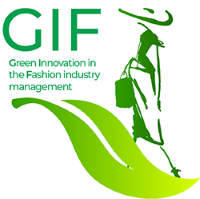About the project
Textile industry is constantly growing since long time, it is unfortunately one of the most pollutant industries on earth and it has been esteemed that the 5/10% of total Co2 emissions depends on it. Over the last years, and boosted by the European Green New Deal, there is an attempt and a focus in the European Union to reduce this problem through the use of new sustainable materials, green energies and training to the owners and workers of those industries.
Most of the textile sector producers are small and medium enterprises, sometimes innovative but mostly traditional that, during last years, suddenly started growing due to the massive request of fast fashion textile products. The partnerships that has been created, decided to apply to this project to face, from an education and higher educational point of view, the problems related to the increase of Co2 emission all over the world and, in particular, in eastern Europe.
GIF project will develop online training courses and a training kit for the development of new approaches and ideas to a “greener” textile sector. GIF will develop new ideas and training for stakeholders who will learn how to reduce their emissions and pollution through e-learning courses, best practices, innovative green initiative, multiplier events and exchanges of information and excellence in the specific sector.
The selected partners covers all the sectors, from TVET to Green fashion industry associations, related to the training that will be settled for trainers, owners and workers of textile sector.
A long-term ambitious objective, following the EU Green New Deal is the reduction of Co2 emissions of the textile sector. Addressing to stakeholders best practices and giving them instruments in order make their industry green will be fundamental for the future of European Union and its 2050 objectives considering the Sustainable Development Goal and the plan indicated by UN with the UNEP agency.
The main objective of the project is to impact on the SMEs in the fashion/textile sector, relevant in the pilot countries and at the same time with a dangerous environmental footprint.
